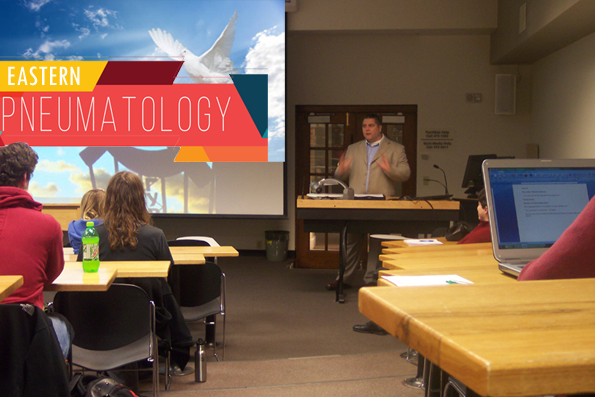Eastern Pneumotology

Dony K. Donev, D.Min.:Eastern Pneumotology
Eastern Orthodoxy can be expressed in one word: theism. The purpose and meaning of life is to become more like God. Deification is pursued by all means of human existence. This quest for divine likeness often includes the typical for the Eastern Church, speculation on the divinity and humanity of Christ, traditions on the doctrine of the Trinity and non-traditional mystical experiences. They appear in the context of both physical and spiritual characteristics in individual and corporate ecclesiastical environment. The role of the Spirit in the process of deification is threefold and involves: creation, re-creation and theism.
Eastern Pneumotology follows the graduate process of theism development. The Spirit is involved in the original creation of the world as well as the new-birth experience. His work however, does not end there, but continues throughout the process of personal deification of the believer.[1]
The emphasis of Eastern pneumatological deification is the relationship between the Christian individual and the Holy Spirit as agents of the visible and invisible worlds. This association is reached through a continuing process of deep-devotional prayer, severe fasting and self-denying asceticism, resulting in an enlightening mystical experience, accompanied by the individual’s denial of self and world and faithful dedication to God.
The variety of spiritual experiences in the deification process can be categorized in three main groups. The first category focuses on the “sensory perception” of the Spirit. This includes experiencing the Spirit as vision of bright light, extraordinary feeling of “untold ecstasy” and even a sweet smell.[2] This category includes experiences through a long stretch of time from Pseudo-Macarius (ca. 300–ca. 390) to Symeon the New Theologian (949-1022). The second category argues that the Spirit can be experienced only intellectually in a high level of understanding and knowledge that is not limited by the human mind’s perceptions of reality. This experience is defined and defended by Evagrius Ponticus.[3] Maximus developed the third experiential category, the Confessor (ca. 580-662). It claims that God, as light, can be experienced only in the uttermost darkness where all other created light disappears and only God’s light remains true.[4]
Prayer is a central and essential part of the above experiences. Without prayer one is not prepared to experience the Spirit, neither is he ready to understand and recognize the power and existence of the divine. Gregory Palamas (XIV c.) further claims that such understanding and recognition leads to an experience, which “transfigures the whole human body after the pattern of Christ’s own transfiguration.”[5] Supernatural miracles, spiritual gifts, knowledge and wisdom are often the reflection of such an experience in one’s life. Such an experience of deep emotional state in a mystical context evolves into a total dependence on divine direction, as a replica of Christ’s obedience.
[1] Gregory of Nyssa, Commentary on Canticles, in Herbert Musurillo trans., From Glory to Glory: Texts from Gregory of Nyssa’s Mystical Writings (New York: Charles Scribner’s Sons, 1961), 190.
[2] John Cassian, Collationes 4.5, PL 49:col. 589.
[3] Alphonsi Mangana, Woodbrooke Studies 7, Early Christian Mystics (Cambridge: W. Huffer and Sons, 1934), 71.
[4] Stanley M. Burgess, The Holy Spirit: Eastern Christian Tradition (Peabody: Hendrickson Publishers Inc., 1989), 4.
[5] Burgess, 5.








Comments